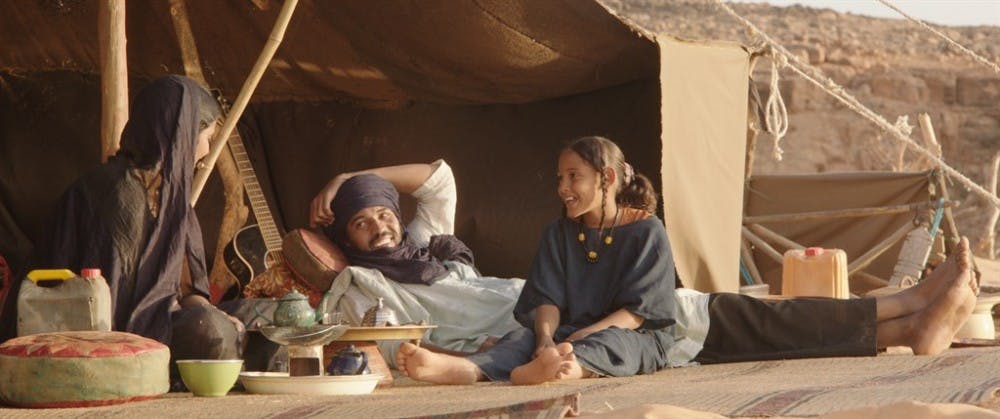The camera pans over the serene and quiet landscape of Timbuktu, Mali, moving across the flat, brown land and focusing in on a sprinting gazelle which, moments later, is violently shot down by religious extremists. This is the first look that viewers get into the aggression and terror that are creeping into this once peaceful community.
Directed by Abderrahmane Sissako, “Timbuktu” is Mauritania’s submission to the category of Best Foreign Language Film at the 87th annual Academy Awards. The film’s greatest strength is the way that it tackles such a complex matter through the use of several smaller narratives.
In Timbuktu, women must wear socks and gloves, music is forbidden and cigarettes are banned. Anyone who disobeys is sentenced to public lashings. The city itself is bleak and brown with buildings made of mud and sand, successfully emphasizing the simple lives that these people are trying to live. The score also highlights this sense of simplicity through the use of earthy woodwinds and sparse arrangements.
“Timbuktu” is, in a broad sense, about the growing epidemic of jihadists terrorizing peaceful people who are simply trying to live their lives. But more specifically, “Timbuktu” is about a man’s love for his family, a woman’s desire for freedom and independence, a child’s deep and tender love of a family cow and the resilience of the human spirit.
Despite being a foreign film about religious extremism, a topic which most people are unable to relate to, “Timbuktu’s” triumph comes from the relatable main themes. These themes include the importance of family and the struggle against oppression and societal pressures.
One of the main storylines follows cattle farmer Kidane (Ibrahim Ahmed), his wife Satima (Toulou Kiki) and their 12-year-old daughter, Toya (Layla Walet Mohamed). Kidane is gentle and loving, and it’s evident through his interactions with his wife how deeply he respects her. He calls his daughter Toya his “little bird,” promising to bring back gifts for her if she watches the cows while he’s gone. “Timbuktu” provides evidence that the love and strength of a family can be found all over the world, even in these troubled regions. These bonds are later tested when he faces a possible death sentence for a scuffle with a fisherman who killed one of his cows.
Despite the tragic subject matter, the scenes are infused with dry humor, a tool used often throughout the film to highlight the hypocrisy of the jihadists. We witness the jihadists arguing over soccer teams and players, and for a moment it humanizes them. That brief moment ends when we later see them arrest a man for playing soccer, and he is subjected to public lashings.
Although the light humor helps a little to balance out an otherwise somber story, there are instances where the humor is applied with too heavy a hand. The character La Chanteuse (Fatoumata Diawara) is an eccentric, crazed woman who dresses in every color of the rainbow while singing and dancing down the street. Although her character provides some light in an otherwise fairly dark story, she comes across as more of a caricature than a fully-fleshed-out person.
“Timbuktu” successfully introduces the unpopular idea that Islamic militants, while cruel and violent, are human too, and it also shows the courage and resilience of these average Muslims as they stand up for themselves and their families. By making the consequences of jihadism personal, “Timbuktu” strengthens the fight against religious terrorism.
“Timbuktu” (PG-13, 97 min) is now playing at Landmark Bethesda Row.





